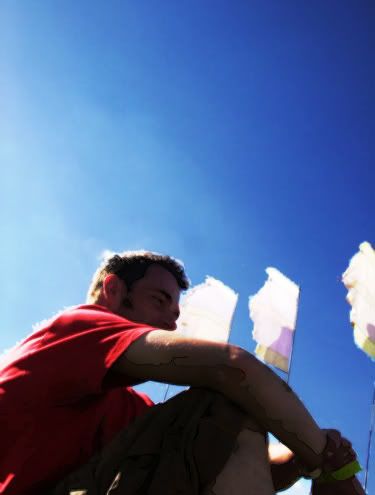...the fifth of November,
Gunpowder, treason and plot.
Funny how you never forgot those kind of things. Tonight is Guy Fawkes Night (or Bonfire Night as most people call it now). Celebrating the foiling of the Gunpowder Plot in 1605 when explosives expert Guy Fawkes, in a conspiracy of English Catholics, attempted to rid England of James I and the Protestant government by blowing up parliament. So how does Britain (and the Commonwealth) celebrate? By burning effigies of Guy and setting off fireworks.
I love a good firework display (and we went to see one in Stamford, with my in-laws on Saturday). What I don't like is the ASBO teens running around the streets with fireworks blazing and the constant bangs and crashes that seem to last a fortnight either side on bonfire night. It sounds like a war zone out there at the moment. If the government can ban smoking in public places I think it should have the balls to ban the sale of fireworks to the general public. What's wrong with going to see a safe, organised display where the fireworks are 100 times better.
Ok, rants over, on with the list of facts about fireworks:
Gunpowder, treason and plot.
Funny how you never forgot those kind of things. Tonight is Guy Fawkes Night (or Bonfire Night as most people call it now). Celebrating the foiling of the Gunpowder Plot in 1605 when explosives expert Guy Fawkes, in a conspiracy of English Catholics, attempted to rid England of James I and the Protestant government by blowing up parliament. So how does Britain (and the Commonwealth) celebrate? By burning effigies of Guy and setting off fireworks.
I love a good firework display (and we went to see one in Stamford, with my in-laws on Saturday). What I don't like is the ASBO teens running around the streets with fireworks blazing and the constant bangs and crashes that seem to last a fortnight either side on bonfire night. It sounds like a war zone out there at the moment. If the government can ban smoking in public places I think it should have the balls to ban the sale of fireworks to the general public. What's wrong with going to see a safe, organised display where the fireworks are 100 times better.
Ok, rants over, on with the list of facts about fireworks:
- It's commonly believed that the first fireworks were made in China about 2000 years ago. They were originally used at Chinese New Year celebrations to scare away evil spirits, a tradition that now extends to other celebrations such as weddings, birthdays and religious festivals.
- 90% of fireworks in Britain are still made in China.
- India and Thailand have also used fireworks in religious ceremonies. Ancient rockets could be up to 10 feet long and tended to be attached to bamboo shoots, up to 40 feet in length.
- The Japanese word for fireworks is "hanabi", meaning "fire flower"
- The burning temperature of sparklers is 15 times the boiling point of water. It only takes three together to produce the heat of a blowtorch.
- Throwing a firework in a public place in the UK is a criminal offence with the maximum fine if £5000
- More than half the firework accidents in the UK happen to children under 16 despite them not allowed to purchase them.
- The first recorded fireworks in England were for Henry VII wedding celebrations. Elizabeth I even had a "fireworks master" for organising the pyrotechnics for special occasions. James II even knighted his after a particularly brilliant display for his coronation.
- John Smith (of Pocahontas story fame) introduced fireworks to America.
- Some states in America, including Georgia and New York have a total ban on fireworks being sold to the general public.


No comments:
Post a Comment